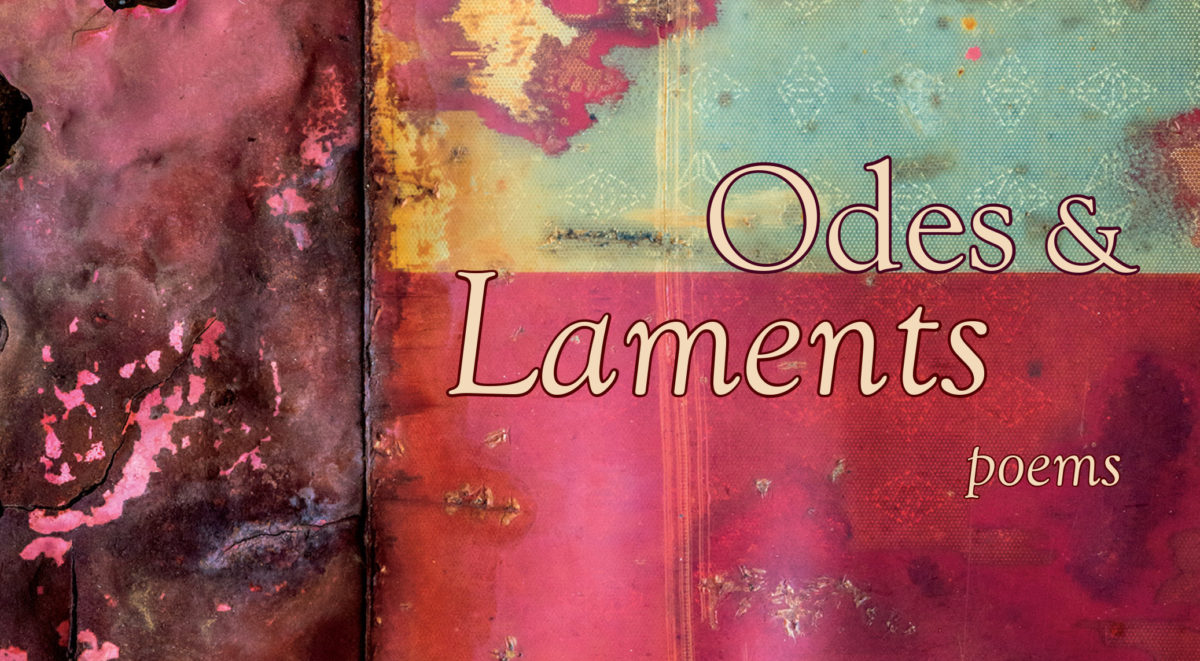
Odes and Laments
Fiona Tinwei Lam
Caitlin Press, 2019
Review by Cynthia Sharp
Odes and Laments is one of three of Fiona Tinwei Lam’s exquisite poetry collections. The cover of Odes and Laments, designed by Vici Johnstone with photography by Janet Little Jeffers, appears as though sections of art are flowing delicately into each other amid layers of felt flowers over paint—suggesting Lam’s work is rich with texture. When I contacted Jeffers to inquire about her photo that so symbolically accentuates Lam’s themes and motifs, she explained that it’s a single surface, “the rusted surface of some old abandoned shipping equipment on a rural road. The colours and textures are all as they appear in real life. There are indeed layers in that surface—various shades of faded paint, rust, bare metal, and even the texture of a reflective material.” This attention to fine detail illuminates the atmosphere in Lam’s lyrical poems, a realm of appreciation, of slowing down and engaging fully with objects to a point of metamorphosis of knowing one another, the paradoxical nature of art. By meditating on items through Lam’s eloquence, readers experience the wholeness of past and future, journeying with her reflections to a state of being both beyond and within each ode.
Lam composed Odes and Laments with an echo of Pablo Neruda’s Odes to Common Things, giving a contemporary view of urgent environmentalism through her softly flowing words. With depth and gratitude for components of life such as food, music, and recreation, each poem turns fluidly, leaving us to gently digest its lavishness. Lam begins with a Neruda quote, “A poetry of loam where water may sing. / A poetry of bread where everyone may eat.” She then builds on “bread where everyone may eat” with “Libation,” an opening ode to apple cider, wherein readers become the recipients of nectar traditionally reserved for gods. Her style holds contrast in a melodic, mystical rhythm:
Let’s open our tongues
to bitter soil, sweet scorch of sun
…Forget
those tortured espaliered trees
…forced
to sing their single notes.
The ode captures old fashioned Canadian autumn in contrast with the earth now struggling against the confinement of exploitative degrees of capitalism. Lam’s verse establishes the relationship of apple elixir to the whole, to rivers and soil, to every element that went into its creation, all of this a metaphor for her insights to follow through the rest of the collection.
From the golden nectar of the gods through each daily subject she brings to life, colour is a binding motif, exemplified in masterpieces like “Orange,” where her unique style weaves together language and culture evocatively, with an undercurrent of often unacknowledged or forgotten history. Beginning with apostrophe, she directly addresses the fruit:
Orange,
you are orange
and everything orange
implies you –
sunrise, sunset, harvest moon
Through the story of the fruit and human relationships with it, an ethereal quality transcends technical genius. In the spirit of Neruda, Lam takes time to engage meaningfully with subjects, to know them in a respectful and holistic way, bringing them to life in fresh imagery. Lam’s poems guide her audience through the past and future of each constituent of existence she pauses on. With an awareness of the effects of our interactions with these subjects—our destiny entwined in our choices— Lam brings them and us to deep truths and connectivity.
Colour is so elemental to Lam that it becomes an organizational structure for her long poem “Spectrum” in the latter half of the collection as she invites us through the reality of a loved one fighting cancer and emerging out of all the moods of the hospital with detailed imagistic sections: “red, violet, blue, orange, green, yellow,” all the stages of diagnosis, appointments, surgery, uncertainty, and recovery.
We move with her through “Milk” and “Ark,” and poems for wolves enduring lost habitat from human encroachment:
Your woodsmen clear cut my forest
then play target practice with the birds.
Keep pushing me to the edge
…until
I’m just a distant howl
…between covers
of a story I never wrote.
Lam engages especially with natural items that are part of the biosphere, part of our Earth cycle, an eloquent call to live peacefully with the planet, to reject practices that abase the cyclical nature of life.
Printed on ancient forest friendly paper, Odes and Laments is a forever book, one to read over and over pondering its wisdom, how it speaks below the surface, ever offering new insight in its alchemy.
Cynthia Sharp is a fine arts graduate student inspired by the rainforests and Pacific shoreline of her west coast home. She’s a full member of the League of Canadian Poets, as well as The Writers’ Union of Canada and was the City of Richmond’s 2019 Writer in Residence. Her work can be found in many literary journals including CV2, untethered and The Pitkin Review.